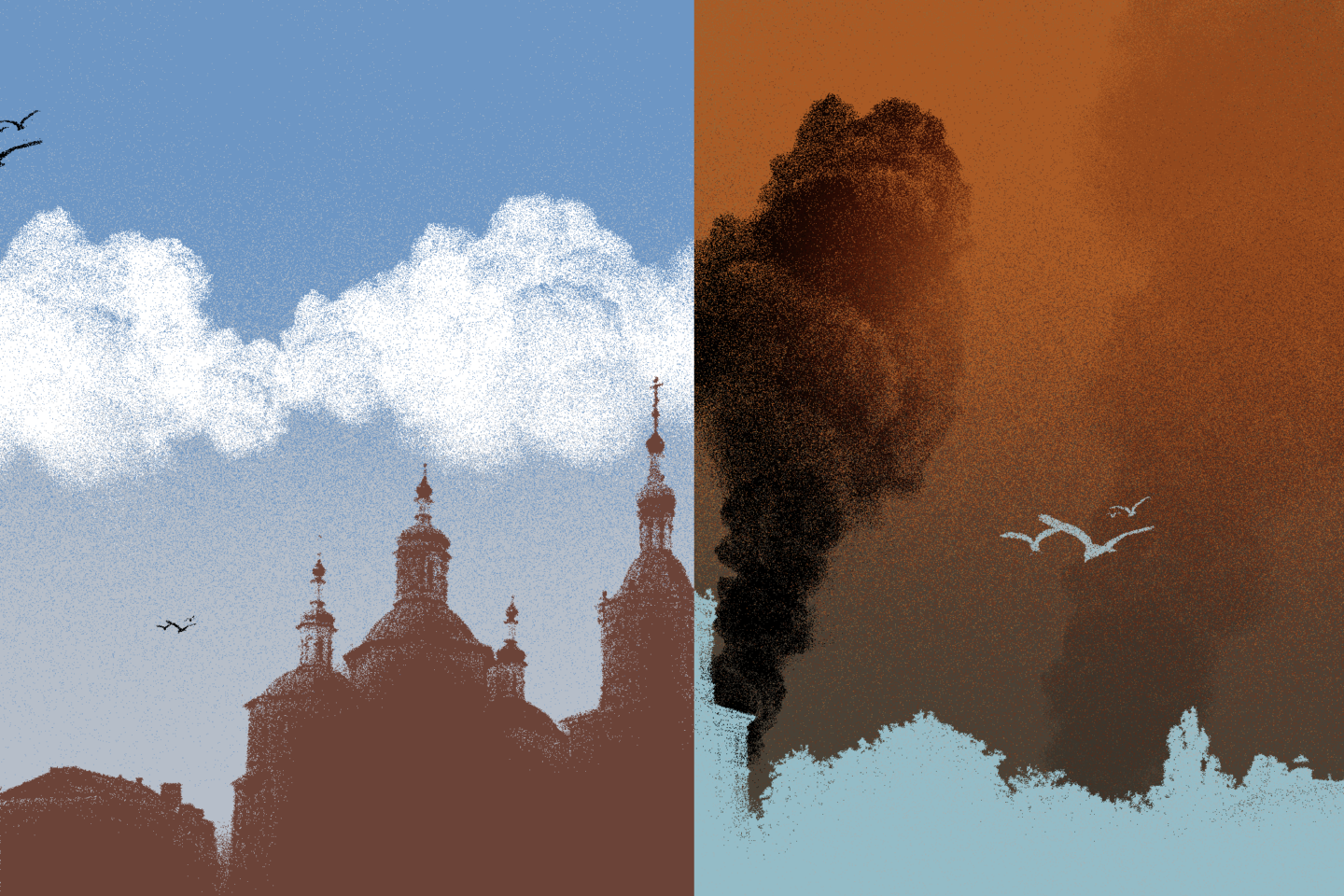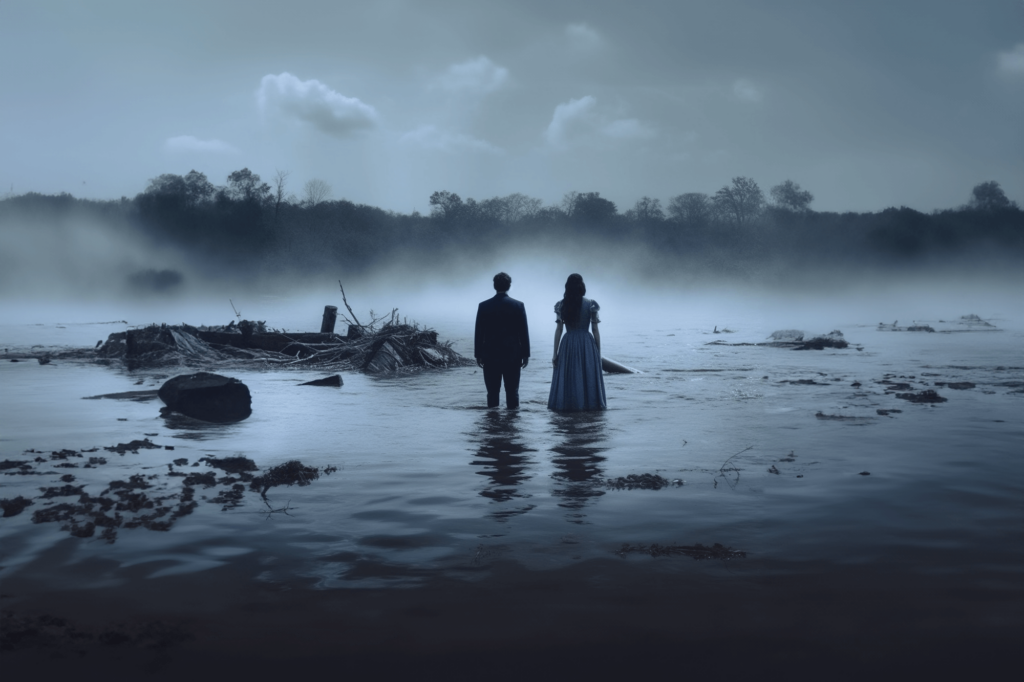When I heard Halyna Kruk read this poem, in the Powder Tower at the Lviv Book Forum in September 2023, I was struck as much by the text itself as by the effect it had on those listening. It’s a busy, noisy venue; people come and go during events; friends and colleagues meet, whisper at the back of the room they laugh, or cry, together in corners. But when Kruk read her poem, the room became still. The ancient walls themselves seemed to be listening.
I wasn’t sure what sort of text I was listening to at first. Was this a poem, or a speech, or a sort of sermon? Halyna Kruk is an accomplished formal poet, her metre, rhyme and wordplay are always arresting. Here, there was less of that. She addressed us in a form that had little time for generic distinctions: it was concerned with message and purpose.
The purpose was to shake us from our complacency, from our comfortable literary worlds.
Literature, and especially poetry, is where language goes to reach the heights of its power and it is thus a space of great potential and of great responsibility.
Responsibility is not comfortable. Many would see it as a burden.
For us, the western guests — concerned, engaged, excited to be there — literature is first and foremost art, entertainment, intellectual and spiritual edification. It is not a literal means of survival, a tool that allows us to live with another’s dying cry in our ears. It should not be a burden.
The Ukrainians in the room could not be accused of complacency. For sure, to say that Ukrainians look on literature purely as a therapeutic tool or a weapon of war, having forgotten about all notions of entertainment, distraction, self-enrichment, would be ridiculous. Ukrainians read and escape through reading during the war just as they watch movies, dance, sing, shop or make love. But in each of these activities, joy, relief, catharsis are tinged with — or perhaps sometimes enhanced by? — the horror of war, the fear of the air raids, the bombings, the fear for loved ones at the front or missing, longing for homes left behind, perhaps destroyed forever, by the constant presence of the dead even in their most life-filled moments. At least, that’s how it looks to me, from the outside.
I think Halyna Kruk is saying that the point of literature is not to afford an escape from reality or to soften it, but to be able to confront reality in all its high-resolution sharpness and then to be able live with what we have seen. And this is what Ukrainian war literature is teaching us more broadly. It has nothing to do with terrible cliches of ‘rediscovering Ukrainian identity’, which is as strong and as fluid as any identity. It is not about patriotism (though there’s no lack of this). It is not about heroes, generals, great armies. It is about the people left in the wake of armies. About how those people can live on and how those who have not experienced the war can live with, understand, talk to, and help them.
It’s a crucial lesson that needs to be learned not just by literary festival audiences but by those at the top of governments and international organisations, those whose political decisions decide whether people living far away live or die, and, if they live, what sort of life is left for them.
This intense exploration of how it is to be a human being alongside other human beings in wartime, how it is to be an ordinary human being who cries, bleeds, laughs and dances all at once, this is what I have learned over the last two years of reading the new Ukrainian poetry of war. It has moved, confronted, embraced and shaken me like no other poetry has. Read it here, and read it in the work of Iryna Shuvalova, Iya Kiva, Yulia Musakovska, Ostap Slyvynskyi, Serhiy Zhadan, Kateryna Kalytko… there are too many to name.
But Kruk’s poem is also a warning. Here we sit, we westerners, comfortably hemmed in by the safety of our states, our borders, our armies, free to believe that literature is not a matter of life and death, all the while not realising that we are only using a small part of it, of its potential, only shouldering a tiny fraction of the burden of its responsibility. We do not need, as Ukrainians have, to remove the buffers from these tracks, from this static literary place. We don’t need to move out into a war-torn landscape. We don’t know how it feels to be unprotected. Yet also, as readers, as writers, we remain bound by the limitations of complacency — those limits that are so comfortable for those inside them and so deadly for those outside.
***
Halyna Kruk,
Translated by Uilleam Blacker
Can I take two more steps or should I pause right here
beside the scattered bodies in unnatural positions,
beside the rusty burned-out car, its wounds from shells
too big to kill just a single, individual.
Aesthetically, it’s too much — the world won’t buy it.
The lack of a logical motive: explain it, you say,
why are they killing you — there must be a reason,
a motivation. This is not how a good plot is built.
Watching from afar, you can always stop in time,
not get too close, where the eye sees too much –
an ugly broken nail on a well-groomed female hand,
a child’s shoe mixed with the rest of the apartment’s contents.
Literature, one might think, exists to convince us
that the lost child’s shoe and the leg are not the same thing,
that a broken nail is no big deal.
That’s if you stop in time, don’t get too close, don’t scrutinise.
That safe distance, those borders within which this can all still be
a banal, contrived plot, the forbidden fruit of a catastrophising imagination.
Literature is no longer an escape route: it’s a side track
from which no train ever leaves.
You get on the train, and you understand: it cannot help you, don’t you see?
Someday, in an emergency, you’ll unblock this side track,
you’ll remove the buffers from this dead-end line and let yourself look.
In a world where literature exists not to kill,
nor to settle scores,
nor to forewarn,
nor to commit every detail to memory,
when you don’t want to see what lies
beneath the rubble on the news and in the photographs.
Such literature is good for nothing.
The child’s shoe, which flew into the air from the child’s foot,
when they were mixed with the shards of glass and concrete,
the women’s broken fingernail emerging from the rubble,
the unblurred remains of the body,
the child’s book that you focus on
so as not to see the rest
so as not to imagine the rest:
what happened between the book and the hand,
between that moment in a family’s Saturday morning and the next scene.
You come too close and are pierced by the shrapnel
Of someone’s muffled last scream
“I don’t want to die.”
Literature exists so we can live with that cry in our ears,
with that hand, with that shoe,
knowing what happened to them in unblurred reality,
unsoftened by artificial intelligence.
That’s why literature exists.




